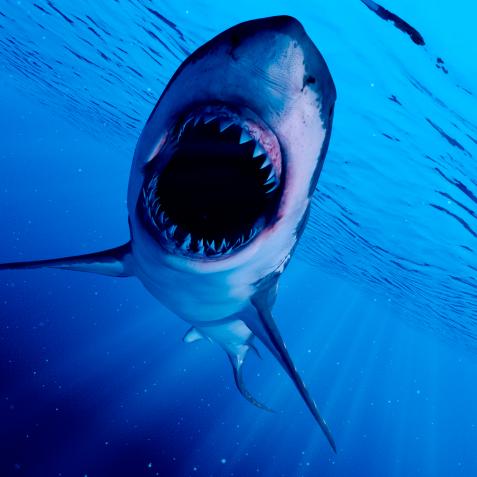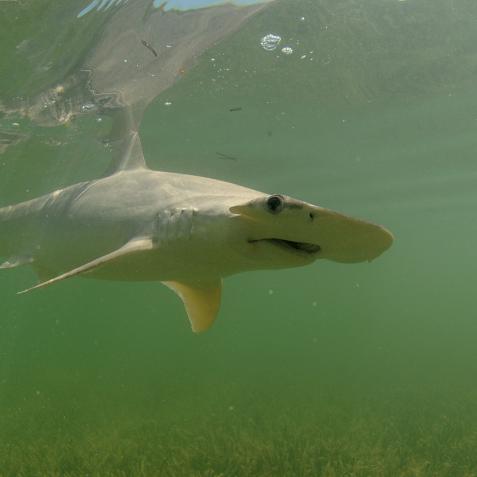
Diego Camejo for Beneath the Waves
Deep-Sea Divers: Tiger Sharks of The Bahamas
Cutting-edge technology takes a team of scientists at Beneath the Waves (BTW) deeper than they’ve ever gone before by shedding new light on how tiger sharks use our deep seas. Don't miss TIGER SHARK KING, Friday, August 14 at 10P ET on Discovery.
Tiger sharks are apex predators in our world’s tropical seas. They are highly mobile and extremely adaptive, capable of thriving in a wide range of different habitats, including the open ocean, on coral reefs, seagrass beds, and more. Tiger sharks also play a critical role in overall ecosystem function, by controlling the population and behavior of prey species, which can help keep food webs and ecosystems in balance.
In the clear blue waters of the Bahamas, tiger sharks stand alone as the apex predator of the region, patrolling the seagrass beds, sandy banks, and coral reef habitats the island nation is famous for. However, the Bahamas are also home to multiple deep-sea features nested among the islands — namely the Tongue of the Ocean and Exuma Sound. It’s there that the seafloor quickly drops from less than 100 feet to thousands of feet — or deeper. Many species of large sharks have been documented making frequent use of deeper water, especially when transiting across open ocean ecosystems. But what about tiger sharks living in the shallow waters of the Bahamas? As it turns out, they are no different and may actually be using the deep water in very special ways.

Google Maps
Spying on Apex Predators
Acquiring detailed data on large shark habitat use and behavior is no easy feat. The team behind BTW — comprised of scientists, entrepreneurs, strategists, and content creators — is paving the way for the future of our ocean with a focus on innovation and breaking barriers when it comes to shark research and marine protected areas.
In May 2019, BTW — in conjunction with collaborators from Trinity College Dublin and Florida International University — tagged a total of 13 tiger sharks using a combination of pop-off satellite tags (PSATs) and animal-borne camera tags to see if — and how — tiger sharks may be using the deep-sea. Both types of tag record the depth and temperature of the water as the shark swims. The camera tag also collects several hours of point-of-view (POV) footage from the animal alongside depth and temperature data, giving us a true “look” at the life of a shark, if only for a short while.
Behind the Scenes: Tiger Shark King 12 Photos
In the Caribbean, a deep-sea camera captured footage of a 14-foot tiger shark suffering an assault by a large, unseen beast. It could be an unknown species of mega-shark or even a cannibalistic tiger shark. Dr. Austin Gallagher from Beneath The Waves wants to find out.
Taking Us Deeper
The results were stunning. With one exception, all of the tagged tiger sharks dove to 650 feet or more at least weekly, while most sharks actually dove more frequently to maximum depths of 1,600-2,000 feet. Generally, animals only traveled to such depths as part of a dive shortly before a return to the warmer surface waters. But these tagged sharks spent on average ~7.5% and as much as 22% of daylight hours at depths of 650 feet or greater. POV footage from camera tags showed tiger sharks diving down along the steep walls of the deep-water features to depths of 1,200 feet or more — into complete blackness. Often simply gliding, these sharks were exerting minimal swimming effort.
.png.rend.hgtvcom.861.485.suffix/1596779852145.png)
Beneath The Waves
Images from the POV of a Tiger Shark
What We’ve Learned
To place these findings in context, it’s important to note that all sharks were tagged in seagrass or reef habitats with water depths of approximately 30 feet or less. And yet, even in short timeframes (sometimes less than 1 day), they were observed moving to deeper water. The exact reasons for this deep-water use remain unclear. It’s possible that the deep-sea may serve as an important location for social, or even reproductive, interactions among large tiger sharks. Or it may be simply that gliding down these walls serves as an energy-efficient method for sharks to search for food on the seafloor.
Regardless, it seems plausible that tiger sharks in the Bahamas may serve as deep-water specialists, with the deep sea playing a potentially important role in the life history of the species regionally. Our team at BTW continues to investigate the deep-sea, and we hope to share more findings from this cutting-edge research as these sharks take us deeper than we’ve ever gone before.
About Beneath The Waves
Founded in 2013 as a non-for-profit organization, Beneath the Waves is dedicated to promoting ocean health and using science and technology to catalyze ocean policy. The team specifically focuses on threatened species conservation and marine protected areas, with a deep affinity for sharks.
This Shark Week, Dr. Austin Gallagher, the Chief Executive and lead scientist at Beneath the Waves lended his knowledge to two shows, including ADAM DEVINE'S SECRET SHARK LAIR, available to watch any time on Discovery GO, and TIGER SHARK KING premiering Friday, August 14 at 10P ET.



















